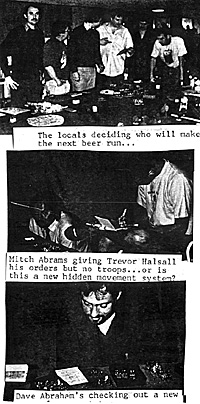 My first impression of Trevor Halsall came about after reading his rules Warfare
Through the Ages which are a set of rules covering warfare from 3000 B.C.
to 1700 A.D. They comprise a manual of 80 pgo. and three supplements for
Ancient, Medieval and Renaissance warfare. The supplements have new
weapons and some additional information pertaining to the specific period.
My first impression of Trevor Halsall came about after reading his rules Warfare
Through the Ages which are a set of rules covering warfare from 3000 B.C.
to 1700 A.D. They comprise a manual of 80 pgo. and three supplements for
Ancient, Medieval and Renaissance warfare. The supplements have new
weapons and some additional information pertaining to the specific period.
After trying the rules which it first seemed overly complex, I began to see what Trevor Halsall"s trying to accomplish. He seemed to be trying to eliminate the problems with many of the rules of the need for interpretation and clarifications by going not towards simplification or glossing over the details but by incorporating the details with good writing which would also entail cross-referencing with as many eventualities as possible even though in any given game very few would be used.
I also wrote to Trevor a few times with questions pertaining to the rules and every time I found that the answer that I had found In the rules was the correct one.
Trevor had to travel to Canada last summer and I talked him into coming to Rochester, N.Y. for a weekend before he left for England.
I had a great time talking to him about the rules and we set up a mini-mini-convention here in Rochester and we had over ten people so we set up a few games ranging from a Macedonian pike battle to a late 16th century battle between a Polish army and a Swedish one. I hope everyone enjoyed it as much as I did. I was delighted with Trevor's attitude to gaming in that one keeps to common sense and that it's all for fun.
Our conversation also turned to the difference between English wargaming and gaming here in the U.S. In, for example, Reading (a community of 200,000) his club will meet once a week and will get between 30-50 people and sometimes as many as 100. It staggers the imagination. I was also impressed by the fact that Warfare Through the Ages was written by him with competition play in mind which I found amusing as people only loosely familiar with the rules say that they would be too complicated for competition and instead they use rules which require interpretations upon clarifications.
He does however point out that WRG predominates the wargaming community in England, he believes that the reasons are many among them in that WRG was at the right place at the right time, and for years Slingshot was almost a house organ for WRG and one can still see a very strong influence from WA. He also admits to the fact that Phil Barker has indeed done quite a lot for the hobby and his contributions have been one Of the reasons that wargaming is where it is now even though he dogs not think WRG rules for the period mentioned above are used so universally due to the quality of the rules.
 In talking to Trevor about his rules his ideas of structure
of battles was not as fluid as some rules allow. He feels that most battles
consisted of the armies deploying and the captains receiving orders from the
commander, then the engagement would begin. After that it was more a function of
timing of attacks already pre-planned than a fluid battle.
In talking to Trevor about his rules his ideas of structure
of battles was not as fluid as some rules allow. He feels that most battles
consisted of the armies deploying and the captains receiving orders from the
commander, then the engagement would begin. After that it was more a function of
timing of attacks already pre-planned than a fluid battle.
Random events would and did have a drastic effect on some battle but more often it was the timing of a specific attack which would decide the outcome. Not the random event. The random event In some rules have no justification other than to speed play and often can and does win or lose a game. I want a game where I can say yes, I made mistake and my opponent capitalized on it and that's why I lost.
The interesting feel that Trevor has instilled in the rules In very intriguing in that It's the tactical situation which decides the outcome, not necessarily super troops or a random die roll.
Trevor has also written and co-written a staggering amount of rules which sees to all have a similar philosophy to the games and how they work. Even if you do not like his WTA rules, one has to be impressed by the overall quality of his many sets of rules which although all feel the same. He seems to capture each individual period flavor. If you are a serious historical gamer, I strongly suggest that you look at Newbury Rules. I feel it would be well worth your while. I was going to and the article in a familiar wargaming phrase 'may your dice always roll high and your opponents always low,' but it you use Warfare Through the Ages, it will depend on your abilities and not the ivory.
A list of some of the rules written or co-written by Trevor Halsall:
Warfare Through the Ages 3000 B.C. to 1700 A.D.
Ancient, Medieval and Renaissance supplements
Napoleonic Warfare
The American Civil War
The Colonial Wars
Sebastopol, Sadova and Sedan
Back to Saga v3n1 Table of Contents
Back to Saga List of Issues
Back to MagWeb Master Magazine List
© Copyright 1988 by Terry Gore
This article appears in MagWeb.com (Magazine Web) on the Internet World Wide Web. Other military history articles and gaming articles are available at http://www.magweb.com